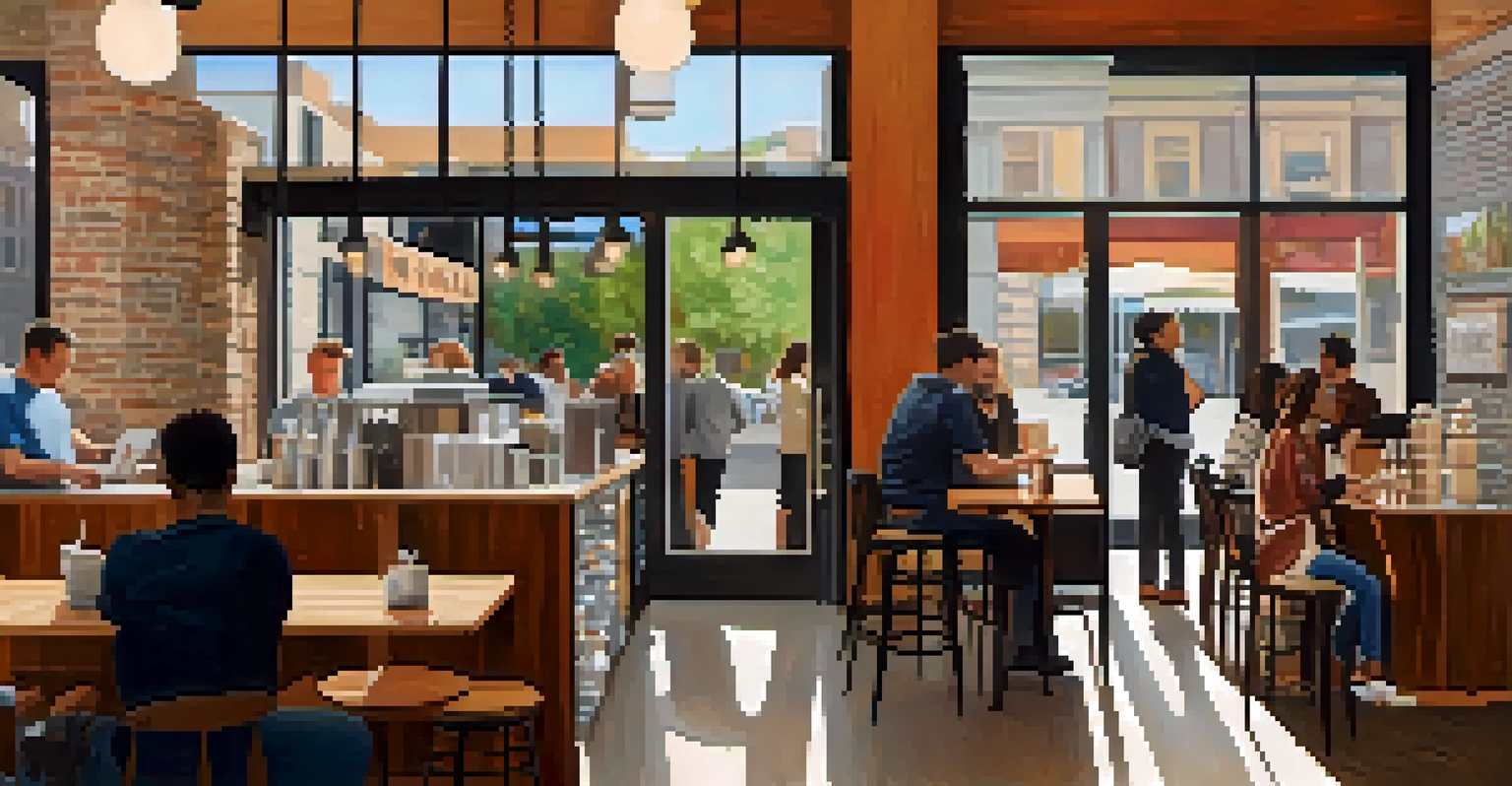Impact of Major Industries on Minneapolis's Economic Growth

Overview of Minneapolis's Economic Landscape
Minneapolis is a bustling hub of economic activity, characterized by its diverse industrial base. As one of the Twin Cities, it plays a pivotal role in Minnesota's overall economic health. The city is home to a variety of sectors, including finance, healthcare, and manufacturing, each contributing uniquely to its growth.
The economy is a complex system, and its success relies on the interconnectedness of various sectors working together.
The synergy of these industries creates a thriving ecosystem that attracts talent and investment. For instance, the presence of major corporations like Target and U.S. Bank not only boosts job creation but also enhances the city’s global reputation. This interconnectedness fosters innovation and collaboration across sectors, driving long-term economic development.
Understanding this landscape is crucial for stakeholders looking to invest or grow in the area. By recognizing the strengths of each industry, businesses can align their strategies with the city's economic goals, paving the way for mutual success.
The Role of Healthcare in Economic Expansion
Healthcare stands out as one of the leading industries in Minneapolis, significantly influencing the local economy. With world-renowned institutions like the Mayo Clinic and Fairview Health Services, the sector not only provides jobs but also attracts medical professionals from around the globe. This influx of talent enhances the city's reputation as a healthcare leader.

Moreover, healthcare innovation drives research and development, contributing to a robust economy. The presence of cutting-edge biotech firms and research institutions fosters an environment ripe for breakthroughs. This, in turn, leads to new startups and increased investment, creating a snowball effect on economic growth.
Diverse Economy Drives Growth
Minneapolis's varied industries, including healthcare, manufacturing, and finance, create a robust economic ecosystem that attracts talent and investment.
The ripple effect of a strong healthcare sector extends beyond direct employment; it supports ancillary services and boosts related industries, such as insurance and technology. This interconnected growth illustrates how vital healthcare is to Minneapolis's overall economic landscape.
Manufacturing: A Backbone of Minneapolis's Economy
Manufacturing has historically been a cornerstone of Minneapolis's economy, adapting and evolving with the times. From food processing to machinery, the sector supports thousands of jobs and drives innovation. Companies like 3M and Medtronic showcase the industry's versatility and commitment to excellence.
Culture is the bedrock of economic development, enriching the community and driving innovation.
The manufacturing sector’s resilience is noteworthy, especially in the face of global competition. By investing in advanced technologies and sustainable practices, local manufacturers are not only improving efficiency but also reducing environmental impact. This forward-thinking approach positions Minneapolis as a leader in responsible manufacturing.
Additionally, the manufacturing industry fuels economic diversity, ensuring stability in times of uncertainty. As new technologies emerge, the potential for growth in this sector remains promising, indicating that manufacturing will continue to play a crucial role in the city's economic narrative.
The Financial Sector's Influence on Economic Stability
The financial services industry is a key player in Minneapolis's economic framework, providing essential support to businesses and individuals alike. With major institutions, including Wells Fargo and U.S. Bank, the city serves as a financial center that fosters economic stability. This concentration of financial resources enables companies to access capital, driving growth.
In addition to traditional banking, the financial sector in Minneapolis is embracing fintech innovations. Startups and established firms alike are leveraging technology to enhance services, making financial transactions more efficient and accessible. This evolution not only attracts investment but also positions the city at the forefront of financial innovation.
Healthcare Fuels Innovation
The city's healthcare sector not only provides numerous jobs but also stimulates research and development, leading to new startups and economic expansion.
The interdependence of the financial sector with other industries amplifies its impact on economic growth. As businesses thrive, the demand for financial services increases, creating a cycle of prosperity that benefits the entire community.
Tech Startups: Shaping the Future of Minneapolis
In recent years, the tech startup scene in Minneapolis has gained significant traction, contributing to the city’s economic dynamism. With a growing number of incubators and co-working spaces, entrepreneurs find a supportive environment to launch innovative ideas. The emphasis on technology not only creates jobs but also attracts a younger, tech-savvy workforce.
The rise of tech startups has led to increased collaboration between established businesses and emerging companies. This synergy fosters an environment of creativity and innovation, resulting in solutions that address contemporary challenges. The tech sector's influence extends beyond its immediate economic contributions, impacting various industries such as healthcare and finance.
Moreover, the city’s commitment to fostering a diverse tech ecosystem is evident through initiatives aimed at increasing inclusivity. By supporting underrepresented entrepreneurs, Minneapolis is not just enhancing its economic landscape but also promoting social equity, which is vital for sustainable growth.
Retail: A Vital Contributor to Local Economy
Retail plays a significant role in Minneapolis’s economy, providing jobs and vital services to the community. With iconic shopping destinations like Mall of America, the retail sector attracts millions of visitors each year, boosting local businesses. This influx of shoppers contributes to the overall economic vitality of the city.
Moreover, the retail industry has adapted to changing consumer preferences by embracing e-commerce and experiential shopping. This evolution has led to a hybrid model that combines online convenience with in-store experiences. As retailers innovate, they not only drive sales but also enhance customer engagement, which is critical in today’s competitive market.
Arts Enhance Local Economy
Minneapolis's vibrant arts and culture scene engages the community and attracts tourists, generating jobs and supporting local businesses.
The impact of retail extends beyond direct sales; it supports a vast network of suppliers and service providers. This interconnectedness illustrates how a thriving retail sector can stimulate broader economic growth, benefiting the entire Minneapolis community.
The Arts and Culture Sector: An Economic Engine
Minneapolis's vibrant arts and culture scene is more than just a source of entertainment; it significantly contributes to the local economy. With a plethora of theaters, galleries, and music venues, the city attracts both residents and tourists alike. This cultural richness fosters community engagement and enhances the overall quality of life.
Furthermore, the arts sector generates jobs and supports local businesses, from restaurants to hotels. Events such as the Minneapolis Art Fair and the Minnesota Fringe Festival not only showcase local talent but also draw in visitors, boosting economic activity. The cultural sector’s ability to create memorable experiences is a powerful driver of economic growth.

Investing in arts and culture is an investment in the community’s future. By supporting local artists and organizations, Minneapolis can continue to thrive as a cultural hub, ensuring that the economic benefits resonate throughout the city.